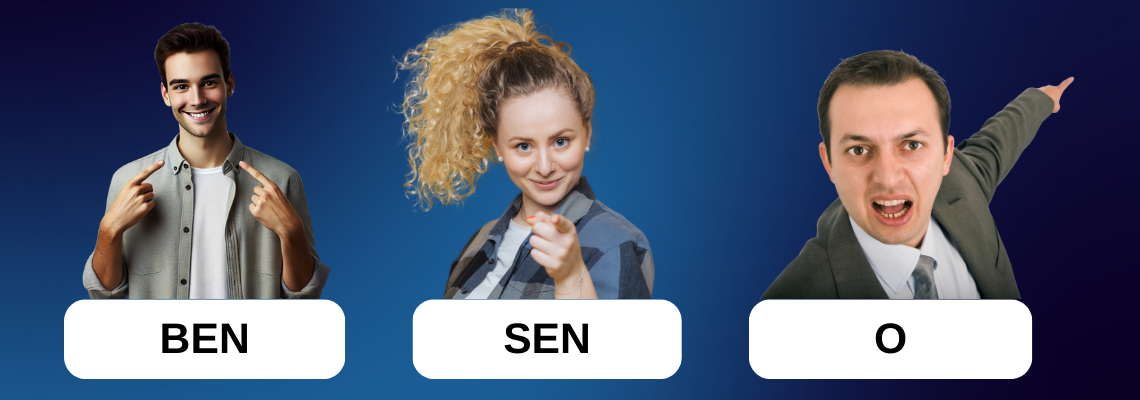Let’s get to know each other!

1. I = Ben
The Turkish word for “I” is Ben.
- Examples:
- Ben öğrenciyim. (I am a student.)
- Ben evdeyim. (I am at home.)
Note: Turkish sentences often drop the pronoun because the verb endings already show who is doing the action.
- Example: Öğrenciyim. (I am a student.) — “Ben” is understood.
2. You = Sen
Sen is the singular, informal version of “You” in Turkish.
- Examples:
- Sen güzel bir insansın. (You are a beautiful person.)
- Sen burada mısın? (Are you here?)
3. He / She / It = O
In Turkish, O is used for He, She, and It. There is no gender distinction in Turkish pronouns!
- Examples:
- O doktor. (He/She is a doctor.)
- O bir kitap. (It is a book.)
Tip: The context will tell you whether O means “he,” “she,” or “it.”
4. We = Biz
Biz means “We” in Turkish and is used to refer to a group including yourself.
- Examples:
- Biz arkadaşız. (We are friends.)
- Biz parka gidiyoruz. (We are going to the park.)
5. You (plural or formal) = Siz
Siz is used in two situations:
- When addressing a group (plural “you”).
- When speaking formally or respectfully to one person.
- Examples:
- Siz öğretmensiniz. (You are a teacher.)
- Siz nasılsınız? (How are you?)
6. They = Onlar
Onlar is used for “They” in Turkish.
- Examples:
- Onlar mutlu. (They are happy.)
- Onlar sinemaya gidiyor. (They are going to the cinema.)
Quick Reference Table
| Turkish | English |
|---|---|
| Ben | I |
| Sen | You (singular) |
| O | He / She / It |
| Biz | We |
| Siz | You (plural/formal) |
| Onlar | They |
Key Differences Between Turkish and English
- No Gender in Pronouns:
Turkish does not have separate pronouns for “he,” “she,” or “it.” The word O is used for all three. - Often Dropped Pronouns:
In Turkish, you don’t always need to say the pronoun because verb endings already show the subject.- Example:
- Gidiyorum. (I am going.) → No need to say Ben because the “-um” ending shows it’s “I.”
- Example:
- Formal and Informal “You”:
Turkish distinguishes between Sen (informal, singular) and Siz (formal or plural).
Basic Introduction Phrases (Temel Tanışma Cümleleri)
- Merhaba! (Hello!)
- The most common way to say hello in Turkish.
- Adım [Name]. (My name is [Name].)
- Example: Adım John. (My name is John.)
- Senin adın ne? (What is your name?)
- Use this to ask someone’s name.
- Nasılsın? (How are you?)
- Informal, use it with friends or peers.
- Nasılsınız? (How are you?)
- Formal, use it with elders or in professional settings.
- Ben iyiyim, teşekkür ederim. (I am fine, thank you.)
- A polite way to respond to “Nasılsın?” or “Nasılsınız?”
- Memnun oldum. (Nice to meet you.)
- Use this after introducing yourself.
- Nerelisin? (Where are you from?)
- Informal, asking about someone’s origin.
- Formal version: Nerelisiniz?
- Ben [Country]’liyim. (I am from [Country].)
- Example: Ben İngiltere’liyim. (I am from England.)
- Kaç yaşındasın? (How old are you?)
- Informal. For formal situations: Kaç yaşındasınız?
- [Number] yaşındayım. (I am [Number] years old.)
- Example: 25 yaşındayım. (I am 25 years old.)
- Ne iş yapıyorsun? (What do you do for a living?)
- Informal. Formal version: Ne iş yapıyorsunuz?
- Ben [profession]’im. (I am a [profession].)
- Example: Ben öğretmenim. (I am a teacher.)
- Hangi dili konuşuyorsun? (Which language do you speak?)
- Informal. Formal version: Hangi dili konuşuyorsunuz?
- Ben İngilizce ve biraz Türkçe konuşuyorum.
(I speak English and a little Turkish.)
Helpful Vocabulary (Yararlı Kelimeler)
- Merhaba – Hello
- Günaydın – Good morning
- İyi akşamlar – Good evening
- Hoş geldiniz – Welcome (formal)
- Hoş bulduk – A reply to “Hoş geldiniz”
- Lütfen – Please
- Teşekkür ederim – Thank you
- Evet – Yes
- Hayır – No
Example Dialogue (Örnek Diyalog)
Person A: Merhaba!
Person B: Merhaba!
Person A: Adım John. Senin adın ne?
Person B: Benim adım Ayşe.
Person A: Memnun oldum.
Person B: Ben de memnun oldum.
Person A: Nerelisin?
Person B: Ben Türkiye’liyim. Sen nerelisin?
Person A: Ben İngiltere’liyim.

